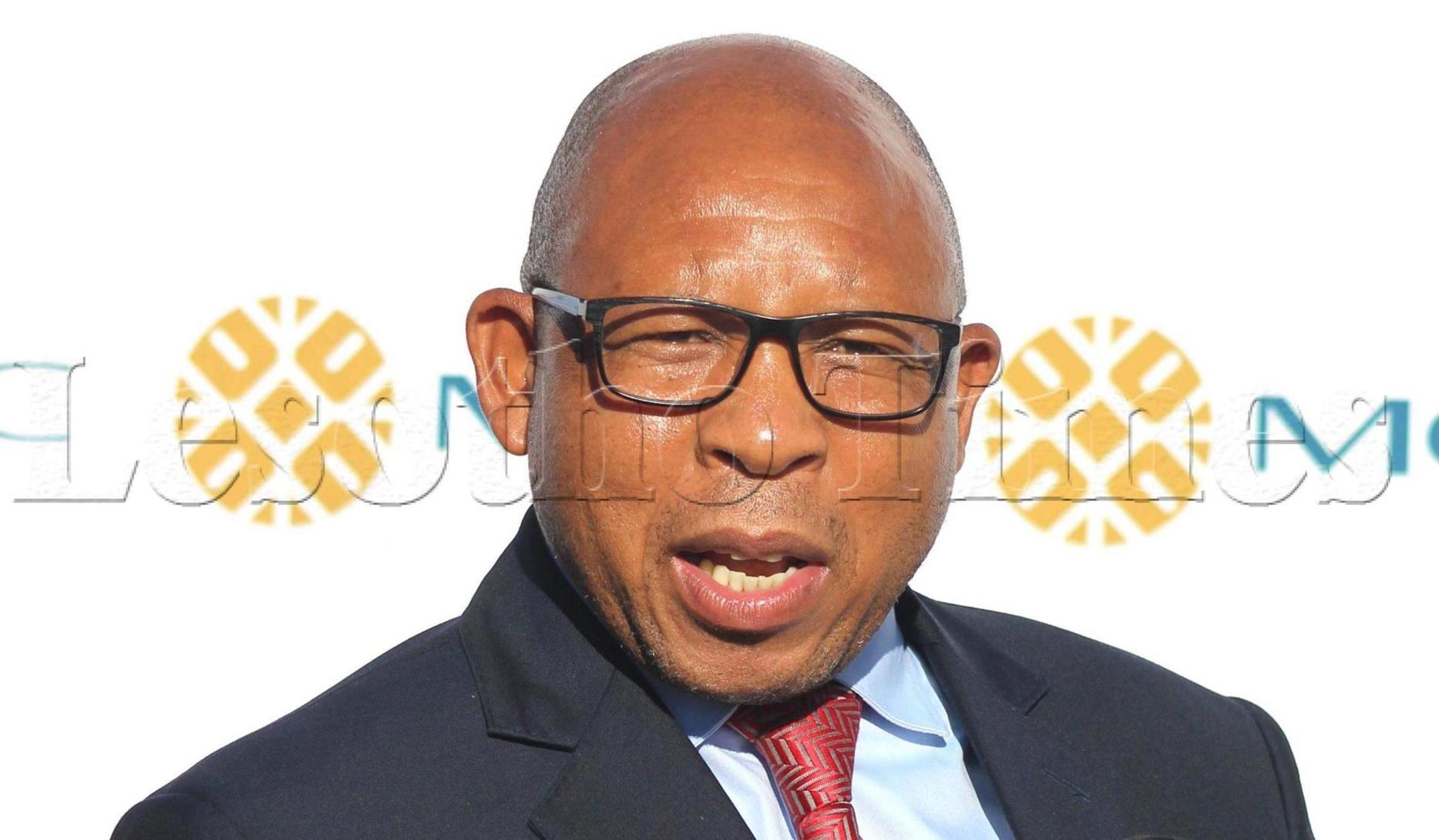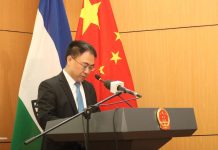Africa-Press – Lesotho. PRIME Minister Moeketsi Majoro has thrown former Minister Temeki Tšolo under the bus, accusing him of illegally signing the botched 2018 M1, 7 billion solar power deal with German company, Frazer Solar.
Dr Majoro said Mr Tšolo, who was Minister in the Prime Minister’s Office in the previous Thomas Thabane administration, had no right to negotiate and sign such an agreement.
He said the deal should have been negotiated with the relevant Energy and Meteorology ministry and the agreement ought to have been signed by himself as he was the finance minister at the time.
He further accuses Mr Tšolo of concealing the fact that Frazer Solar had commenced arbitration proceedings in South Africa against the government of Lesotho.
Due to this concealment by Mr Tšolo, the German company was awarded a massive £50 million (M856 million) in damages for allegedly breaching a 2018 contract the company claims to have entered into with the Thabane-led government for the supply of solar water heating systems, solar generated electricity, LED lights and solar lanterns over four years.
Dr Majoro makes the allegations in his court papers filed in the Gauteng High Court for the stay of execution of the same court’s April 2021 order endorsing the damages award to Frazer Solar by a South African arbitrator in January 2020.
The arbitrator, South African lawyer Vincent Maleka, was appointed by the Johannesburg Bar Council at the request of Frazer Solar who argued that the terms of its agreement with the Lesotho government provided for the appointment of an arbitrator in the event of either party breaching the contract.
Dr Majoro was finance minister at the time of the deal. He had refused to sign the financing agreement for the project aimed at providing Lesotho with 40 000 solar water heating systems, 20 megawatts of solar power capacity, 1 million LED lights and 350 000 solar lanterns over four years.
Mr Tšolo had already signed the main supply agreement before Dr Majoro’s refusal, the company claimed. Mr Tšolo has vehemently denied signing the controversial deal.
Late last month, he told the parliamentary Public Accounts Committee (PAC) that his signature had been forged. Despite his denials, Mr Tšolo was named by Energy and Meteorology Principal Secretary, Themba Sopeng, as the man who approved the deal.
Mr Sopeng told the PAC that Mr Tšolo had made it clear that the deal had the blessings of the then Prime Minister Thabane. The PAC launched its own investigations to establish who actually signed the deal on behalf of the state, especially as Mr Tšolo hotly denies appending his signature.
The PAC probe has since been put on hold to allow the government to purse its case in the Gauteng High Court for the stay of the order endorsing the arbitral award to Frazer Solar.
The order also empowered the German Company to garnish Lesotho’s water royalties and other assets in South Africa to pay off part of the £50 million damages it allegedly owes Frazer Solar for breaching the 2018 contract. The Kingdom of Lesotho is the applicant.
Frazer Solar, South Africa’s Trans-Caledon Tunnel Authority, the Lesotho Highlands Development Authority (LHDA), the Standard Bank of South Africa, the Sherriff of Court- Johannesburg Central and the Sherriff of Court- Centurion East are the first to sixth respondents respectively.
In his court papers, Dr Majoro alleges that Mr Tšolo signed the supply agreement on 24 September 2018 without cabinet approval and despite that he had no authority to sign as he was not the finance minister.
“The supply agreement appears to have been signed by former Minister Tšolo on behalf of the Kingdom of Lesotho, Dr Majoro states.
“Notwithstanding the fact that there was no cabinet approval for the project, Minister Tšolo, of his own accord and without any authority, signed the supply agreement on 24 September 2018.
Minister Tšolo’s signature was witnessed by his secretary, (‘Masentle) Ms Ntobaki and Mr (Hlophe) Matla, the personal aid to the then-Prime Minister (Thabane).
“To the best of my knowledge, at the time the supply agreement was signed, no official in Lesotho government except for Minister Tšolo and his secretary had any knowledge of the Supply Agreement or that it had been signed.
It is also not clear to me how Mr Frazer himself could believe that signing this agreement on 24 September 2018 would be lawful. His interactions with me, as Minister of Finance, up until April 2018, had not led to anything final on the financing side of the deal,” Dr Majoro states.
The premier says Mr Tšolo subsequently wrote to Mr Frazer on 10 December 2018, nearly three months after the signing of the supply agreement, requesting further time so that other government stakeholders could be engaged.
Dr Majoro argues that the correspondences between Mr Tšolo and Frazer Solar demonstrate that the German company approached the Lesotho government with a proposal for a €100 million (M1, 7 billion) renewable energy project and that Mr Tšolo was the primary individual coordinating the deal.
Dr Majoro says this is clear from the correspondences Lesotho recently discovered during its investigations. These include a 5 October 2017 letter from Mr Tšolo to Frazer Solar regarding the financing of the project and a 17 October 2017 letter from Mr Frazer to Mr Tšolo requesting a formal advice on the steps to follow.
“The extent of Minister Tšolo’s involvement, even at this early stage, is irregular. It could never be appropriate for the Minister in the Prime Minister to attempt to coordinate a renewable energy project of this nature. The agreement is in substance a loan agreement on behalf of the government, which would ultimately require payment from the consolidated fund.
In terms of section 28 (2) of the Public Financial Management and Accountability Act, 2011, only the Minister of Finance can sign such an agreement and the Ministry of Finance should have been central to its negotiation and conclusion.
“The Minister of Energy and Meteorology is the appropriate contact person for energy proposals. There was no lawful basis for Minister Tšolo’s involvement as the lead negotiator for the project.
As the Minister of Finance (from June 2017 to May 2020), I engaged with Mr Frazer on a number of occasions regarding the financing of the project over the period between October 2017 and November 2018.
We exchanged various emails and we also met in person. “In my early engagements with Mr Frazer, I was particularly concerned with the pressure he was putting on the Lesotho government to sign a memorandum of understanding (MOU).
Even though an MOU would not be a binding agreement, I made it clear that before the Lesotho government signs the MOU, the officials need to give the project full consideration.
More specifically, in Mr Frazer’s email, dated 12 November 2017, he once again pushed me to sign the MOU. I responded on 16 November as follows: “Dear Robert, I advise differently.
Before we move to MOUs, our officials need to make sense out of this. There are technical aspects that we do not have the time or the sense of detail needed.
“My major concern was always that the proposed solar project, estimated at €100 million, was not something that could be entered into without the relevant government departments and ministers being properly informed and without the requisite approvals,” Dr Majoro states.
He said the proposed deal also required the full consideration of the Attorney General. “My view was that it was clearly the type of agreement that would bind the Kingdom for many years to come and would have a substantial impact on the country’s economy”.
Dr Majoro further alleges that Mr Tšolo signed an MOU on behalf of the Lesotho government on 20 November 2017, even though he had specifically said the MOU should not be signed.
“Although the MOU is non-binding agreement, Minister Tšolo had no authority to sign it.
Further, my email to Mr Frazer dated 16 November 2017 was clear that the Lesotho government should not sign the MOU without further information. For this reason, I did not sign the MOU.
It is inconceivable that Mr Frazer and Minister Tšolo would sign an MOU within four days of my email clearly stating that this should not be done. “This appears to be the start of a series of steps between Mr Frazer and Minister Tšolo to implement a project proposal that had not been properly approved by the Kingdom.
The purpose of the MOU was to give effect to the parties’ intention to proceed with the project subject to final approval by the government. Minister Tšolo should not have signed the MOU.
Important information was still required and lawful procedures needed to be followed before the proposal could be accepted and approved by the Lesotho government,” Dr Majoro states.
He further accuses Mr Tšolo of concealing the legal processes that subsequently unfolded in South Africa, leading to the awarding of the massive default arbitral damages award in favour of Frazer Solar in January 2020.
He said the German company’s letter of demands were only addressed to Mr Tšolo and Ms Ntobaki. “On 30 July 2019, Frazer Solar instituted arbitration proceedings by way of a notice of arbitration.
Once again, the notice of arbitration did not come to the attention of the relevant government officials but was directed to Minister Tšolo and his secretary (Ntobaki). It appears that Minister Tšolo concealed the fact of the arbitration proceedings from the Government of Lesotho.
“As a result of Minister Tšolo’s concealment of the legal process, the arbitration was conducted in the absence of the Kingdom and an award was made against it by default, in the amount of £50 million.
In October 2020, Frazer Solar approached this court for leave to institute motion proceedings to make the arbitration award an order of court. . . “Once again, despite Frazer Solar apparently complying with the requirements of the order, the process did not come to the attention of the relevant officials in the Kingdom.
The (Lesotho government’s) investigation has not been able to determine precisely how this occurred but the DCEO (Directorate on Corruption and Economic Offences) has informed me that it has prima facie evidence which points in the direction of this process having been deliberately kept from the relevant officials, for a corrupt purpose,” Dr Majoro states.
The premier further alleges that he only learnt about the Gauteng High Court’s judgement from the media on 18 May 2021. He states that any seizure of Lesotho’s assets to pay off the alleged debt to Frazer Solar “would be catastrophic for the finances of Lesotho”. He said upon learning of the default judgement in Frazer Solar’s favour, he immediately ordered an investigation to get to the bottom of the matter.
He said the preliminary results of that investigation had indicated a need for the court application for a stay of the order pending subsequent challenges to the legality of the supply agreement, a review for the arbitration award and rescission of the court judgement.
“Due to the urgency with which this application has had to be brought, not all of the necessary investigations have been completed.
However, I submit that the evidence set out below demonstrates that the Kingdom is entitled to a stay of the writ of execution pending applications to:
Review the supply agreement, to be brought in the Lesotho High Court Review the arbitration award, due to inter alia the arbitrator’s lack of jurisdiction, and Rescind the order of this court making the arbitrator’s award an order of the court.
“The Kingdom seeks an order requiring it to institute these proceedings not later than 30 days from the date of the order of this court, failing which, the stay will lapse.
This is clearly a case of the utmost urgency. If this court was to refuse the stay, it would result in real and substantial injustice to the Kingdom, its economy and all of its citizens.
“Without the stay of execution, Frazer Solar will extract €50 million worth of funds and assets from the Kingdom in circumstances where there was never any lawful contractual relationship between it and the Kingdom.
Once the writs are executed, the Kingdom will not be able to recover the funds, as they will almost certainly be dissipated by FSG and placed beyond the Kingdom’s reach,” Dr Majoro states.
For More News And Analysis About Lesotho Follow Africa-Press






